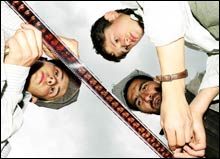 With the possible exception of Yilmaz Güney’s revelatory Yol (1982), no Turkish film has lit up American awareness like this year’s Valley of the Wolves: Iraq, even though it has not yet been and probably never will be released in this country. Apparently a high-impact actioner that happens to make the bad guys American troops, it’s aroused righteous condemnation from people who haven’t seen it. Incidental politics aside, it looks to me like an average generic thriller, Rambo with subtitles.
With the possible exception of Yilmaz Güney’s revelatory Yol (1982), no Turkish film has lit up American awareness like this year’s Valley of the Wolves: Iraq, even though it has not yet been and probably never will be released in this country. Apparently a high-impact actioner that happens to make the bad guys American troops, it’s aroused righteous condemnation from people who haven’t seen it. Incidental politics aside, it looks to me like an average generic thriller, Rambo with subtitles.
You won’t find it in this year’s Boston Turkish Film Festival.
War and macho sensibilities do make an appearance with Ugur Yücel’s Toss Up (2004; April 2 at 7 pm), in which two damaged Turkish war veterans, one partially deaf and rattled by flashbacks, the other missing a leg and seeing ghosts, return to their homes — in Istanbul and an isolated village, respectively. The city guy becomes a punk, the country bumpkin becomes a drunk, and their increasingly hyperbolic distress finds no relief in the first-time director’s exuberant acrobatics with his digital camera.
For the most part, however, this festival focuses on the plight of women, their discontents and desires and the mostly uncomprehending response of the men around them. In some of these films, the male characters are as pre-adolescent in their attitudes and behavior as the addled, violent losers in Toss Up. But that’s understandable since they’re not even 12.
Like the two kids in Ahmet Uluçay’s Boats Out of Watermelon Rinds (2004; March 31 at 8 pm). Bored with their primitive village and their apprenticeships with the local melon seller and barber, they try to devise their own movie projector out of a wooden box and discarded film strips from the dumpy local theater. It’s Cinema Paradiso without the clean old man, though there is a village idiot, and a femme fatale does play a role, an older woman who seems to despise one of the boys but nonetheless treasures his love letter. One sequence intercuts her reading of it with the two mini Godards’ discovery of how to make images move. Such eloquent, ingenious touches make up for occasional sappy lapses.
The age difference increases in Yesim Ustaoglu’s Waiting for the Clouds (2004; March 31 at 6 pm). In a remote village on the coast of northeastern Turkey, a lonely schoolboy befriends an old woman. She withdraws into depression when her sister dies and becomes mute except to call the boy by the name “Niko.” The return of an elderly stranger from Russia affords some clues to her mystery, which delves into the crimes and tragedies of Turkish history and into the nature of memory itself. Unpredictable and filled with humor, the film also has moments — the understated, devastating climax in particular — of heartrending poignancy.